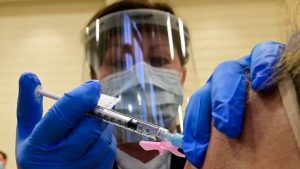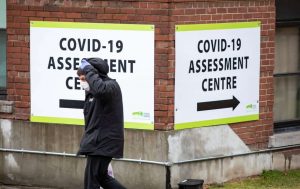Ontario says it will miss target to give 1st dose of COVID-19 vaccine to all LTC residents

Delays in COVID-19 vaccine shipments mean that Ontario won’t be able to provide first doses to long-term residents and other highest-priority groups until five days later than previously expected, health officials said Tuesday.
Ontario plans for 1st doses of COVID-19 vaccines in all long-term care homes by Feb. 15
Members of the province’s vaccine distribution task force had initially hoped to administer first shots to all long-term care, high-risk retirement homes and First Nations elder care residents by Feb. 5.
At a morning briefing for media, members said reduced shipments from both Pfizer and Moderna have forced them to set a new goal date of Feb. 10. Whether that happens will depend largely on when a Moderna delivery expected later this week actually arrives, they added.
Uncertainty about COVID-19 vaccine shipments is expected to continue throughout much of February.
About 58,000 long-term care residents had been given their first shot as of 8 p.m. January 31, officials said, and the administration of second doses began late last week.
Just over 29,100 residents of high-risk retirement homes have also received an initial dose. These homes are generally defined as those that provide memory care for residents — settings in which infection control can be nearly impossible. Another important factor is whether residents dine together in a single hall.
Notably, health-care workers employed outside of the long-term care sector account for the largest share of COVID-19 vaccine doses in Ontario thus far: 138,376 shots as of 8 p.m. on January 31.

Slightly more than 59,000 long-term care workers had received a dose by that same time.
Province has capacity for 40,000 vaccines daily, officials say
Earlier this month, unexpected vaccine shortages made the province shift away from providing vaccines to health-care workers — both in and out of the long-term care sector — and to essential caregivers. The focus shifted to care residents at especially high risk of severe illness or death.
Officials said that once the supply stabilizes, it will expand immunization efforts to once again give vaccines to staff and caregivers in the long-term care sector.
Officials said today they believe Ontario currently has capacity to give up to 40,000 vaccines per day (though the most it has done on any single day so far is 15,899 and the last three days have each seen fewer than 3,000). That capacity could triple or quadruple fairly quickly once the supply of vaccines ramp up, members of the task force said.
In a news release Tuesday, the province said that in order to protect access to second doses of the Pfizer vaccine for those who have already had their first doses, Ontario will keep a maximum interval in place of 21 to 27 days for long-term care, retirement and First Nation elder care home residents.
For all other groups, second doses will happen at least 35 days after the first dose, with a maximum delay of 42 days.
Speaking to reporters, retired Gen. Rick Hillier, who is overseeing the province’s vaccine rollout, said officials can’t pinpoint a specific date for when the next phase of the rollout will begin because of the unpredictability of shipments. When vaccines are available, however, vaccinations will likely be administered by age-group, beginning with those 80 years and older and working down.
As of last week, all public health units (PHUs) in Ontario have at least some doses, they added. Every PHU has also submitted a vaccine distribution strategy to the Ministry of Health and are in ongoing discussions to finalize those plans.
Some individual PHUs, officials said this morning, have been successful in extracting an extra dose from some vials of the Pfizer vaccine. Each vial officially contains five doses, but with the proper equipment and skill, a sixth can be pulled from some, though it is not always consistent.
The federal and provincial governments have worked to procure a supply of the necessary syringes for the extraction process, and they are expected to arrive some time in mid-February, officials said.
Data issues plague daily case count
Meanwhile, Ontario officially reported 745 new cases of COVID-19 on Tuesday, but says the sharp drop was due to data issues.
The Ministry of Health said the total count of new COVID-19 cases was unreliable because the migration of Toronto Public Health (TPH) to the province’s data tracking system resulted in the unit reporting a negative number of new infections.
Case counts in a number of other regions were also affected, the ministry said, though it did not identify the health units by name or detail the magnitude of the impacts on the overall total for today.
Most of Ontario’s 34 public health units switched over to the province’s centralized data system during the summer of 2020. Toronto, however, had until now relied on its own internal program to track and trace COVID-19 infections.
The ministry said the migration of TPH could result in “fluctuations in case numbers” for the next few days.
The unreliability of the province’s official number today means it would be imprudent to draw conclusions about wider COVID-19 trends in Ontario at this point.
The province reported the deaths of 14 more people with the illness, pushing the toll to 6,238.
So far, Ontario has seen 109 cases of the COVID-19 variant first discovered in the U.K. variant and one of the variant that emerged in South Africa.
Another 2,715 doses of a COVID-19 vaccine were administered since the last daily update. A total of 344,615 doses have been administered in Ontario so far.
CBC








Redes Sociais - Comentários